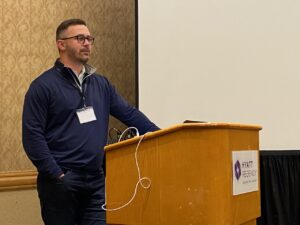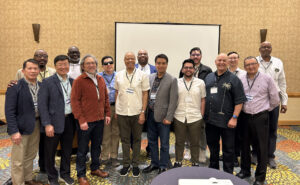
WASHINGTON (BP)–The Southern Baptist Convention’s public policy agency recently joined Korean Americans and other human rights organizations in protesting China’s refusal to protect North Korean refugees.
The SBC’s Ethics & Religious Liberty Commission participated Dec. 22 in a demonstration outside Washington’s Chinese embassy calling for the Beijing government to reverse its policy of returning North Koreans fleeing from the communist dictatorship of Kim Jong Il. Demonstrations outside Chinese embassies or consulates also occurred in five other cities in the United States, as well as in South Korea, Japan, Australia, Canada and Great Britain.
Demonstrators charged the Beijing government with violating international agreements it had signed by repatriating North Korean defectors — an action that dooms refugees to imprisonment, torture or execution, they said. The demonstrators called for the communist giant to protect defectors who had yet to be returned to North Korea.
The ERLC’s Barrett Duke appealed to Chinese President Hu Jintao when Duke spoke at the Washington demonstration, saying, “Do not be known as the man who propped up the most hated and reviled dictator in the world today. Kim Jong Il cannot remain in power very much longer. He does not have the respect, confidence or loyalty of his people or of the civilized world.
“For the sake of humanity, for the sake of the future of the great people of China, for your own sake, President Hu, grant asylum to the North Koreans who look to you for help and protection and work to make North Korea a nation where the people want to live and raise their families and join the world community of nations,” said Duke, the ERLC’s vice president for public policy.
About 50 demonstrators, mostly Korean Americans, participated in the Washington protest. Following the demonstration, leaders sought to deliver a list of jailed refugees and humanitarian workers, as well as a letter, to the embassy but were refused entrance.
In a letter read at the Washington demonstration, Rep. Tom Tancredo, R.-Colo., said he will introduce a resolution in the next Congress to call on the International Olympic Committee to move the 2008 Summer Olympics from Beijing unless there is a change in China’s policy toward North Korean refugees.
North Korea is considered by some observers as the world’s most repressive regime. Among its human rights violations are widespread detention, torture — including forced abortions — and execution of political prisoners. It is estimated by human rights specialists that at least 200,000 political prisoners are in North Korea’s gulag system and about 400,000 prisoners have died in the system during the last three decades. The government has diverted foreign food aid to the military or the black market, which has contributed to the starvation of more than four million North Koreans since 1995, human rights officials have reported.
North Korea also is one of eight regimes labeled by the U.S. State Department as “countries of particular concern,” a designation reserved for the most severe violators of religious freedom.
In October, President Bush signed into law the North Korean Human Rights Act, which establishes a special envoy’s position and calls for U.S. negotiations with the regime to be tied to human rights progress. It also seeks to assure increased protection for North Korean refugees.
–30–
















